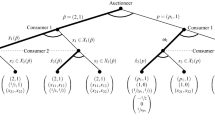Abstract.
This paper establishes a clear connection between equilibrium theory, game theory and social choice theory by showing that, for a well defined social choice problem, a condition which is necessary and sufficient to solve this problem – limited arbitrage – is the same as the condition which is necessary and sufficient to establish the existence of an equilibrium and the core. The connection is strengthened by establishing that a market allocation, which is in the core, can always be realized as a social allocation, i.e. an allocation which is optimal according to an ordering chosen by a social choice rule. Limited arbitrage characterizes those economies without Condorcet triples, and those for which Arrow’s paradox can be resolved on choices of large utility values.
Similar content being viewed by others
Author information
Authors and Affiliations
Additional information
Received: 30 December 1994/Accepted: 12 August 1996
Rights and permissions
About this article
Cite this article
Chichilnisky, G. Market arbitrage, social choice and the core. Soc Choice Welfare 14, 161–198 (1997). https://doi.org/10.1007/s003550050059
Issue Date:
DOI: https://doi.org/10.1007/s003550050059




